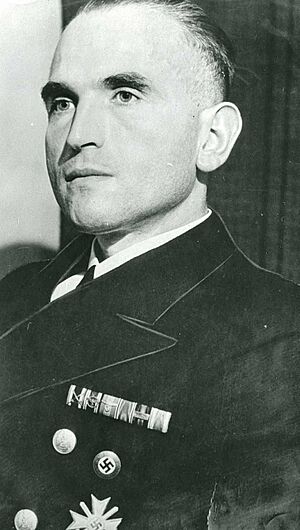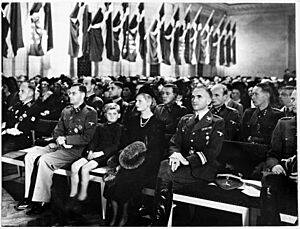Werner Best facts for kids
Quick facts for kids
Werner Best
|
|
|---|---|

Best in uniform, 1942
|
|
| Reich's Plenipotentiary in Denmark | |
| In office November 1942 – 8 May 1945 |
|
| Preceded by | Cécil von Renthe-Fink |
| Succeeded by | Office abolished |
| Personal details | |
| Born |
Karl Rudolf Werner Best
10 July 1903 Darmstadt, Grand Duchy of Hesse, German Empire |
| Died | 23 June 1989 (aged 85) Mülheim, North Rhine-Westphalia, West Germany |
| Alma mater | University of Heidelberg |
| Profession | Lawyer |
| Military service | |
| Allegiance | |
| Branch/service | |
| Years of service | 1931–1945 |
| Rank | SS-Obergruppenführer |
| Commands | Amt I, RSHA |
| Battles/wars | World War II |
Karl Rudolf Werner Best (born July 10, 1903 – died June 23, 1989) was a German lawyer and police chief during World War II. He was a high-ranking member of the SS, a powerful organization in Nazi Germany.
Best played a key role in the Gestapo, which was Nazi Germany's secret police. He helped organize groups that carried out terrible acts in areas controlled by the Nazis. Later, he became the main civilian leader in occupied Denmark. After the war, he was found guilty of crimes in Denmark and spent some time in prison.
Contents
Early Life and Education
Werner Best was born in Darmstadt, Germany, on July 10, 1903. His family moved several times, and he finished his schooling in Mainz. His father, a postmaster, died early in World War I.
As a young man, Best was involved in youth groups and politics. He studied law at several universities, including the University of Heidelberg, where he earned his doctorate in 1927.
In 1930, Best joined the Nazi Party. He also became a member of the SS in 1931, even before the Nazis took power in Germany.
Role in Nazi Germany
As a trained lawyer, Werner Best was important to Heinrich Himmler and Reinhard Heydrich, two powerful Nazi leaders. Best helped create and explain Nazi laws, which gave the SS and police a lot of power over German society. He was seen as a very efficient and cold administrator for the Nazi system.
Best quickly rose through the ranks of the SS. He became the head of Department 1 of the Gestapo, which handled organization and legal matters. He worked closely with Reinhard Heydrich. Both men believed the Gestapo was protecting the German people by removing those they considered "enemies."
The Night of the Long Knives
In 1934, Adolf Hitler saw the Sturmabteilung (SA), another Nazi group, as a threat. Hitler ordered its leaders to be removed. On June 30, 1934, the SS and Gestapo carried out mass arrests. This event is known as the Night of the Long Knives. Best was sent to Munich to oversee arrests in southern Germany. Many people were killed during this purge.
Shaping the Gestapo
Werner Best played a key role in training Gestapo members starting in 1936. He taught them to see themselves as "doctors" protecting the "national body" from "diseases." These "diseases" included communists, Freemasons, churches, and especially Jewish people. This way of thinking encouraged Gestapo members to act against anyone the Nazis considered an enemy.
In 1939, the Gestapo and other security police groups were combined into a new organization called the Reich Security Main Office (RSHA). Best became the head of Department I, which dealt with legal and personnel issues for the SS and security police. He helped Heydrich and Himmler create legal reasons for actions against those the state called "enemies," particularly Jewish people. Best also helped choose leaders for the Einsatzgruppen, which were special task forces responsible for mass killings in occupied territories.
Service in Occupied France
In 1940, Werner Best moved from Berlin to occupied France. He served as the chief of the "Administration" section under the German military commander. During his time in France, Best helped create plans for how Western Europe would be reorganized based on Nazi racial ideas. These plans included taking over parts of France and other countries.
Role in Occupied Denmark
After some political changes in November 1942, Werner Best was appointed as the Third Reich's main representative in occupied Denmark. This meant he was in charge of civilian affairs there. At this time, Denmark was unique because its King, Christian X, and its government remained in power, unlike most other countries under Nazi control.
When the Nazis tried to deport Denmark's Jewish population, the Danish government and King Christian X strongly objected. Best remained in his position in Denmark until the war ended in May 1945.
Danish Police and Resistance
The Danish police initially cooperated with the German occupation forces. However, this changed as the Danish resistance movement grew stronger. In May 1944, Best demanded that the Danish police protect German-controlled businesses from sabotage. When the Danish police refused, the German army began arresting Danish police officers in September 1944. Many were sent to concentration camps.
To prevent more Danes from being sent to German camps, a Danish official suggested building an internment camp within Denmark. Best agreed, and the Frøslev Prison Camp was opened in August 1944.
Rescue of Danish Jews
During the attempt to deport Jewish people from Denmark, many managed to escape to Sweden by boat. Some historians believe that Werner Best may have secretly helped by giving information that allowed the escape to happen. For example, during a critical time, German patrol boats were ordered to stay in harbor for three weeks. Best claimed he provided these dates to his assistant, who then helped warn the Jewish community. This contributed to the successful escape of many Jewish people.
In May 1945, as Germany faced defeat, Best argued against a "scorched earth" policy in Denmark, which would have meant destroying everything as the Germans retreated.
After the War
After World War II, Werner Best testified at the Nuremberg Trials. He tried to make the Gestapo seem like a harmless state organization. He claimed it only investigated serious cases and never forced confessions.
In 1948, a Danish court sentenced Best to death, but his sentence was later changed to 12 years in prison. He was released in 1951 as part of an amnesty program for Nazi war criminals.
Back in Germany, Best worked as a lawyer. He campaigned for amnesty for other German war criminals and former Nazis. He was also involved with groups that tried to influence German politics. In 1958, a German court fined him for his actions during the war. He was charged again in 1972, but he was released due to poor health. Werner Best died in 1989 at the age of 85.
Images for kids
See also
- List SS-Obergruppenführer
 | Emma Amos |
 | Edward Mitchell Bannister |
 | Larry D. Alexander |
 | Ernie Barnes |




